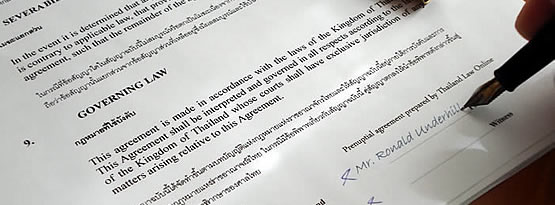Marriage laws
benefits of a prenuptial agreement
Prenuptial agreements in Thailand, as a pre-marriage contract, are specifically governed by sections 1465 to 1469 of the Thailand Civil Code. Worldwide the content of a prenuptial can vary widely, but under Thai law a prenuptial contract can only deal with personal and marital property of husband and wife. In addition, the tough standard for drafting a prenup in Thailand is that the content may not be against the law or good morals.
 Contract Download
Contract DownloadA prenuptial in Thailand is a private Thai contract (sample contract) made in advance of the marriage relating to personal property and marital assets between husband and wife which otherwise would be governed by statutory marriage laws. Thai law requires that the prenup is made prior to the marriage and is registered together with the marriage in the government's 'marriage register'. By endorsement or registration in the government’s marriage register and notation on the marriage certificate the public is put on notice of the existence of the prenuptial. A prenuptial (i.e. a contract before marriage) cannot be made after the marriage registration. When the prenup is made before the marriage but not registered together with the marriage registration then the agreement is void (section 1466).
Prenup's content
Under Thai marriage laws the prenup basically outlines assets of both parties brought into the marriage and management over in section 1476 Civil and Commercial Code listed marital assets during marriage. A prenuptial can also outline the couple’s wishes how to divide marital assets in the event the marriage is dissolved at death or divorce, but in a contested divorce the court in Thailand has to determine the enforceability of such clauses and compliance with Thai laws. Any terms not in compliance with the nature and principles of section 1533 (marital assets are divided equally between husband and wife) and section 1535 (husband and wife are equally liable for the common debts) will be considered against the law and therefore void.
Valid prenuptial
The prenuptial contract can be drafted in Thai and another language and is recognized by law as long as:
- both parties understand the contract’s (prenuptial) content;
- its clauses are not against good morals or the law (giving little flexibility in drafting the agreement), and;
- the prenuptial is signed in front of 2 witnesses and entered into the marriage register together with the marriage.
If the couple complies with the above requirements then basically a valid prenuptial contract is created under Thai law. Any unfair terms in the prenuptial or terms which are under Thai law considered against good morals are null and void. Also any clause in the contract that the relations between husband and wife as regards to marital property are to be governed by foreign law shall be void.
Contract DownloadFAQ
Does my Thai fiancee need to get independent legal advice?
A prenuptial agreement in Thailand must comply with the above mentioned 3 points. Independent legal advice for your Thai fiancee is not a requirement for the enforceability of the prenuptial in Thailand, especially because the prenup must be registered in the marriage register and any unfair terms in the prenuptial are considered null and void under Thai law.
How to obtain a prenuptial agreement in Thailand?
Obtaining a Thai and English language prenuptial agreement in Thailand can be fairly simple and inexpensive when you download the template contract from this website and simply complete the missing personal details.
Do I have to disclose all financial information when making a prenuptial in Thailand?
This is under Thai law not a requirement for making a valid agreement, but significant existing financial information (property and debts of each) is normally listed in the attachments to the prenuptial agreement registered at the time of marriage in Thailand. It is in any case recommended to make a personal balance of all personal assets at the time of marriage and to keep written evidence of this.
Do I need to make an international prenup
A prenuptial agreement can have international elements in it, but an 'international prenuptial agreement' does not exist. When making a prenuptial agreement in a marriage between a husband and wife of different nationalities the prenup could for example include a provision in which the couple designate which country’s law should apply to their matrimonial property regime (some allow you to designate the law of any State of which either spouse is a national at the time of marriage and designation). This is especially important for foreigners who marry in Thailand and when there are assets in another jurisdiction you want to protect, and/or when you plan to live in another country after the marriage. Note that a prenuptial agreement you make in Thailand under Thai law may not always be fully recognized in other countries (and vice versa), or there may be a conflict of laws between the different jurisdictions. When a couple from different countries (Thai/ foreign) enter into marriage in Thailand they should (when required), in addition to legal advice in Thailand, ask for a legal advice from a legal professional qualified to give legal advice on the financial consequences of marriage under the other jurisdiction involved. A properly drafted prenuptial in a marriage with international elements, including a valid choice of law, could prevent that property of husband and wife are divided in a divorce or at death in a way you did not anticipated.
Prenuptial Contract Downloadoriginal article source: samuiforsale
Related:
- family law in Thailand legal start
- view sample Thai English prenuptial agreement
- download prenuptial (Th-En) contract
